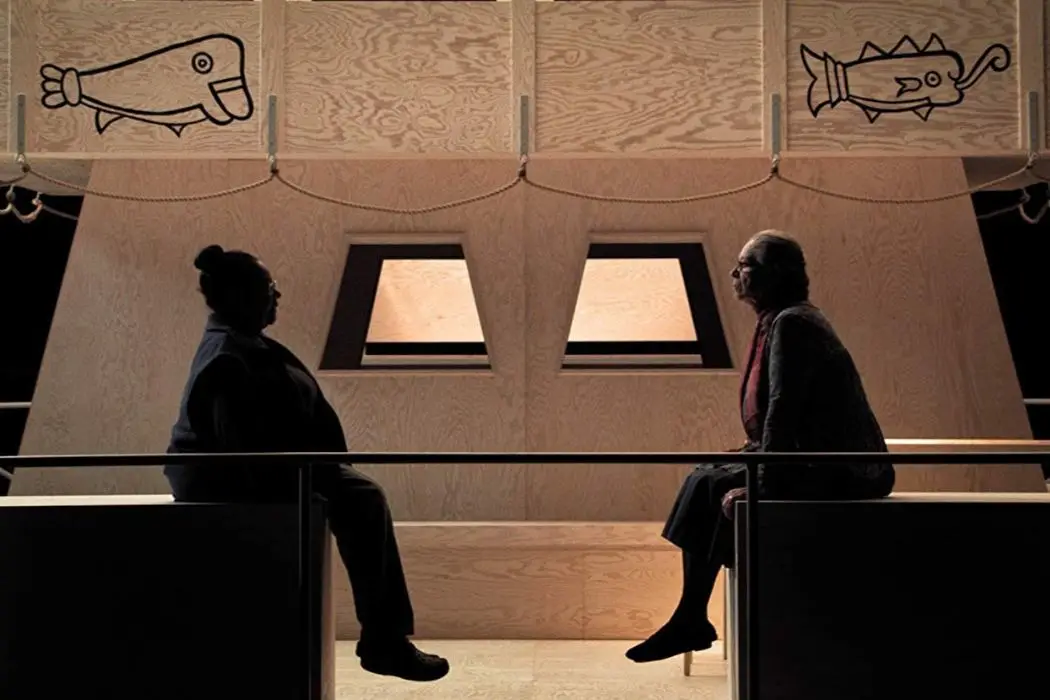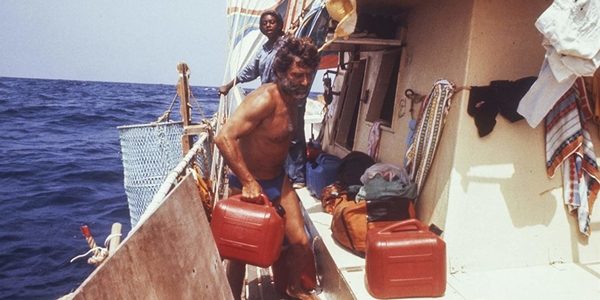THE RAFT: A Clever Subversion Of Expectations

In 1973 a controversial psychological experiment took place—noted anthropologist Santiago Genovés took a group of volunteers onto the Acali raft, aiming to study the causes and effects of sex and violence. The journey took them from the Canary Islands to Mexico, on what was dubbed the “Sex Raft” by various media outlets. And Santiago fully expected the group—made up of five men and six women of different backgrounds—to live up to that name, or turn on each other along the way. Perhaps even a bit of both.
The marketing for The Raft, the new documentary from director Marcus Lindeen, has certainly played into those expectations, promising the untold story of the so-called “Sex Raft” to unsuspecting viewers. And the film itself opens by building up this myth—Daniel Giménez Cacho explains, in character as Santiago, the premise of the expedition and the remaining subjects dig into their reasons for taking up this strange offer—before the rug is pulled out from under us.
The Real Story
Because what really happened aboard the Acali is actually a far more intimate human story than the salacious headlines would have you believe, a story about people looking back at a pivotal moment in their lives, reckoning with the impact it had on them.

As The Raft goes on it becomes more and more apparent that Santiago’s’ ideas were deeply flawed, despite early indications. Lindeen cleverly strings us along for a while though, documenting a scenario wherein one of the men pummels a fish to death, as Santiago’s own records try to claim this as the first sign of the emerging violent tendencies among the crew. Meanwhile, further evidence in Santiago’s favor is presented in the form of several early hookups among the group.
However, we begin to realize that these incidents are not only played up to sound more conclusive than they really are but they’re also little more than isolated events, far more mundane than Santiago liked to believe. It’s here that the film will begin to either fascinate or lose the viewer, as the supposedly scandalous story takes shape into something else entirely, one that turns its gaze onto the viewer and examines our relationship to the media we consume.
Subverting Expectations
The film certainly isn’t without its well-crafted twists and turns, the likes of which have tantalized audiences in recent documentaries—after realizing that all is not going to plan Santiago gets more and more controlling, trying to push the group towards erratic behavior, while the crew briefly float the idea of mutiny during a particularly heated time. But it’s far from the scandal viewers might have been hoping for—the most shocking turn of events actually concerns one woman opening up to another in a way she never had before, while the conclusion has more to do with the remaining volunteers finding some form of closure on the whole situation.

For an experiment taking place in the ’70s, the philosophy behind Acali Expedition also has rather a lot in common with the reality TV we now watch. We tune in expecting many of the same things Santiago hoped to see in his participants, and respond negatively when we don’t get it. The film doesn’t go as far as to shame the viewer for their watching habits, but the parallel is certainly there and some of the most intriguing material in the film comes from the subversion of those expectations. From turning its focus on how the viewer responds to the media they consume, and what they’ve come to expect from it.
Conclusions: The Raft
This will understandably be disappointing to some, but for those in the market for something that plays with assumptions to tell a story of people coming to terms with their shared past, The Raft is a very rewarding watch. The volunteers on board the Acali may not have broken out into bursts of sex and violence, but they did discover a lot about themselves along the way and thanks to Lindeen, later found closure. An experience the film helps us share along with them.
Have you seen The Raft? Did it meet your expectations or did it fall short?
The Raft was released on June 7th, 2019 in the US.
Does content like this matter to you?
Become a Member and support film journalism. Unlock access to all of Film Inquiry`s great articles. Join a community of like-minded readers who are passionate about cinema - get access to our private members Network, give back to independent filmmakers, and more.













